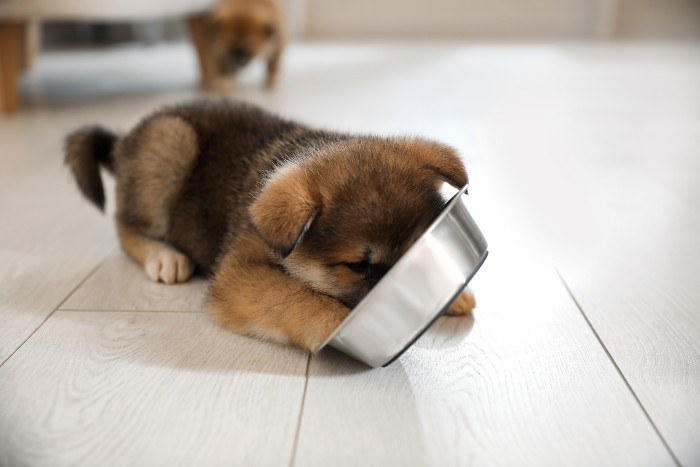Five Common Mistakes When Feeding Puppies

DogFoodAdvisor is reader supported See how
Dog Food Advisor is 100% impartial and is never paid to promote any brand. But if you buy using links on this page, we may earn a referral fee.
Bringing a new family member home can be a major life adjustment. Whether you have kids, cats, or other dogs — puppies absolutely demand attention.
From playing to potty training to ensuring puppy teeth don’t destroy the furniture, new pet parents certainly have their hands full. But too often, new pet parents don’t spend enough time focusing on proper puppy nutrition.
So, we spoke to Irene Gunawan, Director of R&D at 5-star-rated Open Farm to learn more about puppy nutrition and common mistakes pet parents should avoid.
Lack of Hydration
“Younger dogs, like puppies, are more prone to dehydration than adult dogs due to their higher metabolic rate and smaller body size,” says Irene.
“Try offering moist or wet food (sometimes using warm water or bone broth) to help boost their overall water consumption, especially during this active and developmental phase.”
Inadequate Nutrition
Ensuring long-term health and vitality starts with a nutritionally complete diet.
“Overlooking the ingredient panel on your puppy’s food is a major miss, as puppies thrive on ingredients tailored to support their growth and development,” says Irene.
“Things like healthy DHA development and protein blends (instead of single protein) can help prevent allergies down the line.”
Inconsistent Feeding
“Establish a routine! It’s essential to get puppies on a consistent schedule for regulating bowel movements and setting an expectation for when it’s mealtime,” says Irene.
Overfeeding
“Some puppy breeds grow faster than others and overfeeding can often result in obesity and other health issues such as joint problems and a lower life expectancy,” says Irene.
“Make sure to adhere to feeding guidelines as strictly as you can while also monitoring your puppy’s weight throughout this growth stage.”
Too Much, Too Soon
“Treat! Kibble! Couch! There’s an exciting world of food, treats, and enrichment activities awaiting your pup, but try to slow down the introduction of too many things at once,” says Irene.
“When a puppy consumes snacks, treats, and other food from constant enrichment activities, you may find mealtime to be a bit difficult.”
Getting a new puppy is exciting and nerve-wracking, you will most likely make some mistakes — it’s completely normal. But, the more you know before bringing your newest family member home, the more you can be prepared.
Final word
The Dog Food Advisor does not accept money, gifts, samples or other incentives in exchange for special consideration in preparing our reviews.
However, we do receive a referral fee from online retailers (like Chewy or Amazon) and from sellers of perishable pet food when readers click over to their websites from ours. This helps cover the cost of operation of our free blog. Thanks for your support.
For more information, please visit our Disclaimer and Disclosure page.



